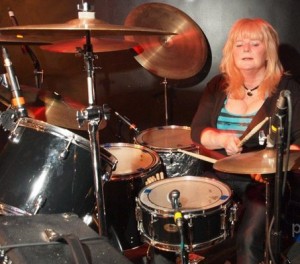 It seems like women have crashed through another barrier in the modern music world. Chick drummer are becoming less of a novelty. Greater-Boston is the home to a solid trend of women drummers. The women interviewed for this article are full of confidence and talent and are respected as drummers, regardless of their gender.
It seems like women have crashed through another barrier in the modern music world. Chick drummer are becoming less of a novelty. Greater-Boston is the home to a solid trend of women drummers. The women interviewed for this article are full of confidence and talent and are respected as drummers, regardless of their gender.
The different perspectives between the older and younger women in this features traces the development of the public perception of seeing a woman behind the drum set. People are finally getting it that drumming, while a physical chore, is by no means limited to men.
For years, drummers, along with bass players, were often considered “sidemen.” Most of the women interviewed for this article didn’t even have a concept of what a sideman is. They certainly don’t see themselves as sidemen. They see themselves as very much the pulse of a band.
JANE MACAUSLAN drums for a Cape Cod-based Green Day tribute band called GREEN DAME. MacAuslan and her lead singer are both women, hence the moniker Green Dame. MacAuslan doesn’t just play drums in Green Day. She is the creator of the project, forming her tribute band in August 2010 and debuting it in January 2011. Since then, MacAuslan has gotten Green Dame in a lot of nice venues in Worcester and Boston.
MacAuslan has been a professional musician since high school. At age 49, she can look back at her career from its midpoint and recall playing in musical theater orchestra pits, jazz quartets, Top 40 dance bands, and heavy metal bands in the 1980s hair metal days.
MacAuslan became a drummer at a young age. She was rebelling against her mother who put her in piano lessons. Her teacher wouldn’t let her play Three Dog Night and all the other songs she wanted to play. Her uncle was a drummer and when she went to his gigs, she was always seated behind his set where she could see everything he was doing. This inspired her and by the time she was nine, she was taking drum lessons.
MacAuslan is more noted-trained than other drummers from her generations. She is versatile and can read drum charts and sheet music, tackling anything from classical to punk.
“I think a lot of drummers tend to narrow themselves,” MacAuslan said. “They don’t try new things. I never leave any stone unturned. I’m always willing to learn new stuff, old stuff, relearn things. I’m always doing it.”
Aside from her uncle, Jane took drums in school and private lessons with two different instructors for seven years. Her favorite drummers are Buddy Rich and Keith Moon. She likes their jazzy looseness within different time signatures. “I’m always willing to learn something that’s beyond me,” she said.
The term sideman is irrelevant to her. “Without drums, there’s nothing,” she said. “That solid beat. I feel the drummer is the conductor of a band. And the same goes for the bass player. The bass player and my bass drum has got to be tight. The bass player is the rhythm section, but they’re also melodic. So they’ve got two hats to wear.”
Jane formed the Green Day tribute because she liked them in concert and she saw a market for it. “I was absolutely in awe of the amount of energy that came from this band and the control that Billy Joe Armstrong has over his audience. All he has to do is stand there and give a look and the crowd just goes wild. He can just wave his arm and everybody would shut up and there wouldn’t be a sound in the place.”
Jane said she has not had any struggles with sexism and discrimination from male musicians, even though she started out in the business in the 1970s, back when female drummers were a rarity. She did, though, have to prove herself. “Once I got behind the kit, jaws dropped. They just couldn’t believe it. But you had to prove yourself,” she said.
MacAuslan feels women are gaining more acceptance as drummers because there are much more of them out there on the scene. “In this day and age I think men are more accepting of women stepping up and being possibly better than they are,” she said.
Jane uses Pearl drums, but she used to play Sonar. She mikes each drum and cymbal individually. “It depends on the venue. Her bass drum is always miked.
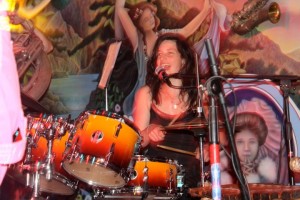 Drummer TARA GREENBLATT of the TARA GREENBLATT BAND is a lead singer as well as the skin slapper in her band. Greenblatt plays a hand drum called the djembe that allows her to accompany herself as soloist.
Drummer TARA GREENBLATT of the TARA GREENBLATT BAND is a lead singer as well as the skin slapper in her band. Greenblatt plays a hand drum called the djembe that allows her to accompany herself as soloist.
On the scene for 12 years, Greenblatt became a drummer because rhythm was a personal, innate thing for her. “I had to be moving. I always had a rhythm in my head. I always had a drum beat going on in my head. I didn’t really recognize that until I was a little older. I drummed on everything since I was since three years old.”
Greenblatt distinguishes herself in that she is a lead vocalist as well as a drummer. She also leads her own band from the drum set. Her original songs are all composed and crafted primarily around the drum. “Lyrics will come to me, and I can’t actually sing the lyrics out as I’m crafting a song until I have a backbeat behind it. So the drums and lyrics form at the same time for me. I play the djembe pretty expressively.”
Greenblatt studied traditional west African drums and rhythms for two years with a drummer from Senegal. Greenblatt no longer drums west African rhythms, adapting her knowledge to what she calls her Tara rhythms, her own style. “I swipe. I scrape. I do all kinds of stuff on the djembe to give it all kinds of voices.”
Greenbelt’s training also includes drum set lessons in high school. She plays behind the drum set for two bands in New Hampshire, the Folk Soul Band, an eight piece dance band with American roots, and she also plays in a band called Lunatic Fringe, an improvisational roots and jazz band.
Her first major influence was Steward Copeland of The Police. “I listened to him so carefully. He’s just a huge influence on my drumming,” she said, “and certainly John Bonham. These are all drum set drummers, but they’ve certainly influenced my hand drumming. My hand drumming really stems from my drum set drumming.” She also listens to a ton of traditional African drummers, some Latin drummers, and any women drummers, like Meg White from The White Stripes.
As far as drummers being called sidemen, Greenblatt said it depends on what the intent of the music is. “I’m not a sideman,” she said, “but maybe in the Folk Soul Band and in Lunatic Fringe, I’m an ensemble member is how I feel because every piece and part of the band, every instrument has to be relying on the others. However, I have to say in a dance band, I think the rhythm section is kind of the backbone. It provides that steadily reliable foundation for the rest of the players to be able to play around. I don’t think they’re side people at all. The drum slows down and speeds up everybody.”
Greenblatt, a younger musician, said she has not faced any discrimination as a female drummer, save for a time as a kid using her sticks on the Brookline trolley. “That time in my life was the only time I ever got a few comments, one or two just goofy comments. It never hurt my feelings. It was like ‘What do you use those things to play?’ Just stupid stuff.”
Greenblatt sees a brighter future for women drummers. “There are plenty of manly oriented instruments, and I’d have to say the drums are one of the main ones. But there’s not a lot of us out there that drum hard and sing and all that stuff together. But no, I haven’t experienced any discrimination. I think the future is open for female drummers, and I think the more the merrier, and I think there’s a lot more support now, especially because of these different social networks online. Any kind of group can meet other people like themselves. We are in a different time just in terms of how we can communicate and that reaches more people.”
For equipment Greenblatt uses a sonar drum set and she loves zildjian cymbals and sticks. She doesn’t mike any part of her kit and only uses a vocal mike. In her solo shows she might put an instrument mike on her djembe. She doesn’t really like a lot of amplification.
“I don’t like wailing on drum sets,” Greenblatt said. “I like the way the sound of percussion mixes in. The band members don’t want me drumming loudly.”
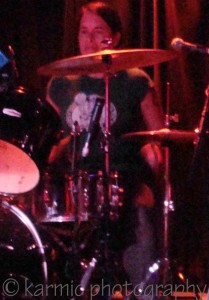 RENEE SOLANO drums in the four piece Boston band SANS NOMENCLATURE. Aside from being the drummer, Solano also writes some of the songs, lyrics and music. Solano plays enough guitar, bass, keyboards, and vocals to help craft the melodies.
RENEE SOLANO drums in the four piece Boston band SANS NOMENCLATURE. Aside from being the drummer, Solano also writes some of the songs, lyrics and music. Solano plays enough guitar, bass, keyboards, and vocals to help craft the melodies.
Her band Sans Nomenclature has been around since August 2009. She’s been playing professionally for 12 years. She was drawn to drums as a kid, as her father was a drummer.
“He was a jazz drummer,” Solano said. “He played all over Europe and the United States with very well known people. I actually started out on the bass because my brother was the drummer in the family and (her attitude at the time was) who wants to do what their little brother does. But after I while I changed my mind.”
Solano said all musicians distinguish themselves because every person’s personality comes out in their play. She took lessons for eight years, and she has a two year degree in music from Cabrillo College in Anna Cruz, California.
Solano moved to Boston from California in April 2009. Her influences include many drummers from many genres, her dad, Fred Below, the Motown drummers, James Brown’s drummers, Chris Adler from Lamb Of God, Buddy Rich, and Max Roach, and Russell Batiste.
Solano said that sometimes a drummer is a side man. “A lot of bands that I’ve been in, I’m playing their songs and doing their music, so basically I am the sideman because I don’t have any input into what’s going on. The current band, Sam’s Nomenclature, everyone writes and everyone contributes so no one’s a sideman.”
When asked about discrimination Solano said “It happens all the time. Honestly, it was worse on the west coast. To your face, they’re really nice and polite, and they’ll go behind your back and hire somebody who’s not even half as good as you. Out here, there were a couple of times with parents (who thought) that I can’t teach their kid because I’m not male, but I’m not apologizing for not having a penis.”
As entrenched as discrimination is, Solano sees the current generation being raised differently “and with the many female student’s I’ve had over the years, it will reach a point that when a girl drums they won’t even blink,” she said. “It’s much more common than say 20 years ago. It will be much more common, much less of a novelty.”
Solano feels it’s better to think that she simply belongs rather than worry about whether people are going to discriminate against her. If someone doesn’t want to hire her, there isn’t anything she can do about it. It is a personal preference whether to hire a player, unlike corporate America in which a company could be legally forced to hire the most qualified. “Really, who wants to work with somebody like that anyway? Why would I even want to be in that kind of hostile environment. It’s not like bands make a ton of money. If you’re doing it for the love of it, you don’t want to work with somebody who has a bad attitude.”
For equipment Solano still uses her 1990s five piece Yamaha stage custom kit with Zildgin cymbals.
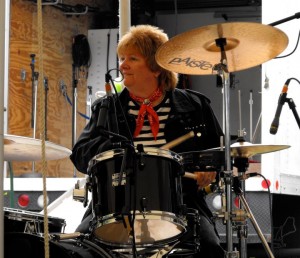 LAUREL BLANCHARD of James Straight And The Wide Stance and GIRL GANG has been playing professionally since 1975. She’s been with Straight for two years and Girl Gang for four years. Girl Gang is an alternate band out of North Hampden, Massachusetts.
LAUREL BLANCHARD of James Straight And The Wide Stance and GIRL GANG has been playing professionally since 1975. She’s been with Straight for two years and Girl Gang for four years. Girl Gang is an alternate band out of North Hampden, Massachusetts.
In the 1970s, Blanchard was in all female band called Lilith that had released an album, and, she was also in Lou Miami And The Kosmetics, which had released several albums and whose videos made it onto MTV.
Blanchard became a drummer because it was what she wanted since childhood, drumming on her parent’s living room chair. “I would kneel in front of it and make like it was a drum set and play my records to it. The arm of the chair would be like the cymbal. I knocked the stuffing out of the chair. After my parents saw the stuffing falling out of the chair, they realized that ‘maybe she’s serious about playing the drums.’ When I was 14 I got a drum set.”
Blanchard had several private lesson teachers during her teens. She was influenced by Ringo Starr of The Beatles. Blanchard was also intrigued when she saw Karen Carpenter playing drums on television. “That was an amazing thing in the late 60s to see her playing,” Blanchard said, “before they took her off the drums. It wasn’t lady like.”
Blanchard was also into the big, wide open sound of John Bonham, and she became fascinated with Hal Blaine when she realized Blaine when was the studio drummer for many radio hit singles in the 1960s. “I read his book recently, and it’s got a whole listing of the songs that he had hits with and it’s like ‘Holy crap.’ I used to practice all those songs.”
Blanchard distinguishes herself from other drummers by avoiding the busy techniques. “I keep it simple,” she said. “I play very simple, and I pay very strict attention to the bass player. I’ve got to click with the bass player. I’ve got to find a way to blend in with the bass player, then the rest can play music around it.”
Sideman is not a term Blanchard even thinks about. “When you’re in a band, you’ve got to all consider yourselves equal. There’s no person above another. There is no sideman.”
Blanchard, back in the day, had to work against sexual discrimination. “Of course, when I was kid, absolutely,” she said “There weren’t any female drummers. When I actually saw Karen Carpenter playing on stage, that affirmed that a woman really can play. They thought it was bad. The Carpenters thought it was bad. They kept trying to get her off the drums, so finally they did.”
Salesmen at instrument and equipment stores wouldn‘t understand why Blanchard was in their store looking at drum gear.
“I’d go to music stores and I’d be standing there waiting in line and there was a guy behind me, they’d look at the guy behind me and say, ’Can I help you, sir?’ as if I’m the girlfriend, just really stupid stuff.” Blanchard said that it didn’t stop her from getting work, as auditions required everyone to prove themselves. But at one party where she had asked the band if she could sit in, the band didn’t really believe she was a drummer.
Yet, these days, audience members no longer approach her after the show to tell her she’s pretty good for a girl. “People would come up to me after a gig and say, ’Oh, I wasn’t sure if you were really a girl.’” Many female audience members do tell her that they wish they had defied their own parents who would not let them take up drums.
Blanchard thinks the future is going to be bright for women who drum. “We’re here and we’re here to stay,” she said. “Especially the late 70s, a lot of women bands were coming around and popping up all over the place. There were jazz bands, rock bands, punk bands, soul bands, in the Boston area too. They were just like coming out of the woodwork, all female bands.” Blanchard added that in the three decades since the female band revolution, people have gotten used to seeing women musicians on stage.
Blanchard is a drum collector who owns ten drum sets, and she plays mostly Ludwig sets, vintage kits from the 1960s and 1970s.
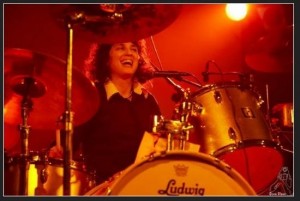 LINDA SHORE, a.k.a. Jessie Mire, of Muck And The Mires has been with Muck for eight years, playing around the country and around the world. Shore works in Muck And The Mires with her husband, Evan Shore. Before Muck And The Mires she was in a band with him called The Nines.
LINDA SHORE, a.k.a. Jessie Mire, of Muck And The Mires has been with Muck for eight years, playing around the country and around the world. Shore works in Muck And The Mires with her husband, Evan Shore. Before Muck And The Mires she was in a band with him called The Nines.
When asked how long she’s been a professional musician, Shore quipped: “Am I professional?” And giggled. She actually started out in 1990 with a band called She Cried.
Shore became a drummer because, as a youngster, her brother, a guitarist, had his own band over the house and she wanted to play too. The drums just called out to her. “I guess it’s just the sound of them and how you can play them,” she said. “I get attention.”
She distinguishes herself by not having a lot of influences and just plays it the way she feels it. “I just play it my way,” Shore said. “I love Ringo. I love Keith Moon. But I never try to play it that way or in that older style.” She also listens to Louis Armstrong’s drummer Baby Johns. Shore’s grandfather was a multi instrumentalist who had sat in with the likes of Count Basie, on clarinet.
Shore thinks there is more to drumming than being a sideman. “The key is to be solid, simply to enable the rest of the band to play on top.” A life long learner, Shore continues to take drum lessons. These days she studies at DiCenzo’s Drum Ship in Quincy, Massachusetts. “You can just take it so many directions,” she said.
Shore had faced some discrimination in her early years as a drummer “It wasn’t as common as it is now. It was one of those things. First, my parents hated it. We grew up in Londonderry, New Hampshire. I’m like 16 years old and I’m like looking through ads in the Phoenix for bands. I’d get off the phone and I’d yell to my father, ‘Hey Dad, is Dorchester far from here.’ He’d say ‘you’re not going down there.’” She eventually drove down from Londonderry to Boston in her teens on her own.
She took a little subtle flack for being a girl drummer. “I had a lot of people surprised. I had an ad out, and I didn’t have my name, just a number. When they called, sometimes I could hear disappointment. I could tell,” she said. “I think it’s very common now, and I think people dig it. We’ve played in Europe. We’ve played a lot of shows with a lot punk bands and hard rocks bands. I’m not seeing sexism. I think people are pretty chilling.”
For equipment Shore plays a Pearl drum set.
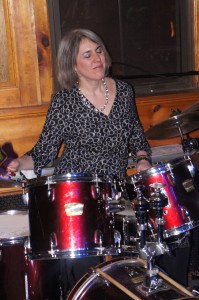 NAOMI “COOKIE” PIERCE of THE SUGAR SHAKES has been with her band for about a year. She’s been playing professionally for 11 years, having picked it up at age 36. “I never thought I’d get to the point where I am now,” she said. “I can go out and play with some really good musicians and play in a decent nightclub and take home some money. When I started playing drums, I thought I’d be in the basement with some friends.”
NAOMI “COOKIE” PIERCE of THE SUGAR SHAKES has been with her band for about a year. She’s been playing professionally for 11 years, having picked it up at age 36. “I never thought I’d get to the point where I am now,” she said. “I can go out and play with some really good musicians and play in a decent nightclub and take home some money. When I started playing drums, I thought I’d be in the basement with some friends.”
Though she started late she always wanted to do something in music. A friend had left his drum kit in her house when he needed a place to store his drums. Her let her play them, and he gave her some lessons. “Drumming became something I could do while my son was napping on the third floor. I’d be down in the basement playing. It was really the music that pulled me along from there.”
Pierce’s distinguished feature is that she finds playing the song is more important that playing the drums. “I’ve very conscious of trying to transmit the joy in the music to the audience. I think if the audience wanted to hear the song the way the way it was on the record, they’d stay home and listen to the record. So, when you’re at a performance you have to give the audience a spiritual gift as well. I don’t think that makes me unique, but I think that’s what makes my playing special.”
Pierce took drum lessons with one teacher for ten years, and she was recently able to start studying with Sergio Belloti. Her favorite drummer of all time is Charlie Watts. “I wouldn’t be so arrogant to say my playing is like is, but I really try to emulate his feel.” She also likes everything from Afro-Cuban jazz to Memphis soul to Nirvana.
She disputes the description of drummer as a side man because she thinks that “the drummer is at the heart of the music. “When I was a kid I always used to think that bands like Led Zeppelin were always about the guitars and The Rolling Stones were all about the vocals. You certainly couldn’t have those bands without those things, but you couldn’t have the sound of those bands without the drums. I feel like the drums are very central to the feel of the song. Then, in terms of the drummer being the front person, I’m told I have a lot of stage presence, and when my band is playing, people will tend to watch me play. I guess that’s great if people enjoy the show because they’re focused on me, but I really don’t view that as my role in the band. I like to be kind of behind everybody helping making the engine go.”
As for discrimination, Pierce said the music scene cannot escape it. “I think that sexism and racism is so pandemic in our society, so I think that the music scene has as much of a struggle with isms as any other scene,” she said. “But I think we have our little kinks in the armor in the music scene that you don’t get other places. There are certainly a lot fewer women playing out there, but sometimes that gives you an edge. Sometimes it works against you.”
Pierce thinks the future looks bright for women drummers. “As long as we can find foot ware that looks good on us and we can still play the drums in them, I think women drummers have an excellent future,” she quipped.
Pierce uses a sonar drum set with Paiste cymbals and Vic Firth drum sticks and she has a rise cymbal from Italian company called Ufit. She has a five piece Sergio Bellotti drum set on order from Italy and she can’t wait for it to arrive.
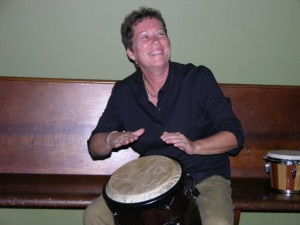 KATHY BURKLY made a big splash on the Boston music scene in the 1980s with the all female band GIRL’S Night OUT. These days, Burkly freelances and occasionally plays in a trio with former members of GNO.
KATHY BURKLY made a big splash on the Boston music scene in the 1980s with the all female band GIRL’S Night OUT. These days, Burkly freelances and occasionally plays in a trio with former members of GNO.
Burkly moved back to Boston six months ago after living and working in Nashville for 12 years. She played mostly session work for original artists on the local Nashville scene. “I never broke into the super high A-list,” she said. Burkly did play drums on a couple of songs that made it onto movie soundtracks and she played a gig at Dolly Parton’s house.
Burkly has been playing out professionally since 1973, after leaving an acoustic guitar duo with her sister. The drums made much more sense to her after she saw another kid’s marching band drum. She was 11 years old at the time. “I made him let me put it on and I banged on it and said, ‘OK. I want one of these.’” She bought herself a Sears Roebuck drum set a year later before taking up drums in her high school jazz band and marching band.
After high school, she moved to Nashville to play in a Top 40 country band and traveled a lot before returning to Boston to attend Berklee, graduating in 1983. She went to Berklee to learn to read music because she faked it in high school. “I wanted to know more about how the math of music was constructed because I didn’t know any of that,” she said.
Burkly feels she is different from other drummers in that her groove and her influences are strongly influenced by heavy funk bands like The Meters, Tower Of Power, southern funk and country. “I’m really comfortable with both,” she said. “I really love both styles and pockets. I really feel both of them.”
Burkly likes a good song for the craft of songwriting and holding that up rather than playing fancy licks. Her influences have included Russell Batiste, Bernard Purdy, and Ronnie Nilson.
Burkly had some struggles with discrimination in the sense that some bands didn’t want a female road musician. “If you’re going to be doing stuff that you don’t want your wife or girlfriend to know about, you don’t want another woman to be seeing it either.”
Burkly has two sets of Eames drums.
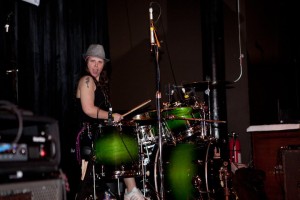 ANGELA DEFAZIO has been with Rhode Island cover band 5 FLAVOR DISCOUNT for four years. DeFazio has been playing for 13 years. She used to be a tap dancer, and she gravitated to the drums because of a rhythmic thing in her.
ANGELA DEFAZIO has been with Rhode Island cover band 5 FLAVOR DISCOUNT for four years. DeFazio has been playing for 13 years. She used to be a tap dancer, and she gravitated to the drums because of a rhythmic thing in her.
“It must have been the rhythm,” she said. “I went to a concert and it was just the big sound of an outside stadium and it’s just like, ’Oh, yeah, I think I want to do that.’” It was Veruca Salt, PJ Harvey, and Live at Great Woods in the early 1990s that made DeFazio feel like becoming a drummer star.
Aside from marching snare drum at school DeFazio took private lessons for three years. She played with everyone she could find at jams and open mikes.
DeFazio digs the funk and Motown genre, which includes the entire Funk Brothers Band and James Brown’s drummers. She also likes rockers John Bonham, and Matt Cameron.
Her cover band 5 Flavor Discount requires DeFazio to segue from rock to reggae to funk to disco to pop. She has to change her mind set from song to song, especially when she goes from a hard rock tune to something like reggae.
“When you first start doing that, it’s a little weird because you really have to reset,” she said. “With this band I’m just so used to it now. It’s something you have to make yourself used to. It doesn’t just happen. It’s another thing you just practice. It’s not just changing the dynamics of how you play, but it’s also the entire feel of it. You have to make it feel like reggae. To go from a Zeppelin tune like ‘Rock And Roll’ to ‘Stir It Up’ you have to pull on the reins and know how to adjust that and get the feel right.”
DeFazio said drummers are absolutely not side men. “I’ve never been referred to as a side man or side person. I guess I’ve been fortunate enough I’ve always worked with people that see a musician as a musician. The drummer is one of the most important parts of the band. You hold down the time. That’s your job. You’re the foundation of a house is how a lot of people look at it. If you’re foundation sucks, you’re house is going to fall down.”
DeFazio finds herself facing some discrimination and sexism. “It’s mostly just from guys being intimidated or just being immature,” she said. “It’s not so much younger kids that are immature about it. It’s older guys who feel threatened, or whatever. I don’t want to throw stones at them either. It’s like you walk into a club with your gear, you’re getting judged. It’s like ‘Oh, are you carrying that for your boyfriend?’ C’mon. ‘No actually he’s carrying my shit.’”
DeFazio doesn’t feel that the sexual discrimination is as bad as it was long before she got into the business. “It’s 2011. Get over it,” she asserted. “If I was on a CD, you wouldn’t know if it’s a guy or a girl.”
For women who want to drum, DeFazio said brighter days are coming. “Because more and more women are doing it now, it’s obviously going to inspire a younger generation just to want to do it. I know people who teach lessons, and you see more and more girls going in to get drum lessons. Girls are becoming more comfortable because they see other women out there doing it.”
For equipment, DeFazio plays a Pearl session custom maple. She has a Pearl free floating snare with a brass shell on it. She uses Zildgin cymbals A-custom and she has a side snare for her hip hop material. “The gear never gets any lighter no matter how times you move it,” she said.
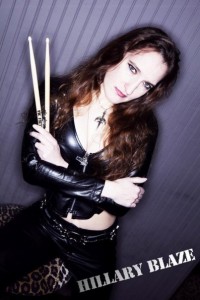 HILLARY BLAZE is the drummer for the four piece all female hard rock and metal band JADED. Jaded has been around for six years, and Blaze has been a professional musician for 15 years.
HILLARY BLAZE is the drummer for the four piece all female hard rock and metal band JADED. Jaded has been around for six years, and Blaze has been a professional musician for 15 years.
Blaze became a drummer because her father, a musician, was teaching her older sister to play guitar and she wanted to play an instrument to play with them. Off the top of her head, she could only think of drums. Her parents were perplexed at her selection of drums.
“The minute they got me my first lesson, I was totally hooked,” she said. “It was so much fun. I took to it like a fish to water. I just loved it. I can’t even explain it. There’s just something about it. It’s energetic. It’s organic. It’s primal but it can be complex and simple. It’s hard for me to describe what the draw is, but I just absolutely love playing.”
Blaze is somewhat different from other drummers because although she is bombastic and showy, she’s also an “inner drum nerd.” “I love the intricacies of drumming,” she said. “I’m not technically one of the best drummers out there. But I love the guys out there who are just amazingly technical. I try to emulate them. I try to add some of that, even though the style of music I’m playing is a little straight forward. I like to add, in my own mind, to me, what’s challenging.”
Blaze played in high school bands and in college she read Modern Drummer avidly. After seeing an ad from well known jazz drummer, Gary Chaffee, who was trying a pilot program called “Learning By Tape,” Blaze signed up for the by-mail course Not satisfied with sending tapes back and forth in the mail, Blaze moved to Boston from Ohio to study with him. She was prepared to camp out on his front door step until he let her in his studio. Fortunately, Blaze didn’t have to go that far.
Blaze’s other influences are Eric Carr from Kiss, jazz drummers Dennis Chambers and Tony Williams, Scott Rockenfield from Queensryche, as well as Vinnie Apice, Dave Weckl, and Vinnie Colaiuta.
Blaze said it depends on the gig whether the drummer functions as a sideman or as something more. “Any drummer that is into the music that is being played can definitely affect it,” she said. “I can definitely name a couple of bands off the top of my head where the drummer made that band. The band was not the same before they had that drummer or not the same if that drummer left. Most notably, Rush, before Neil Peart. On the heavier side, Slayer. Dave Lombardo left for a while and Slayer was not the same.”
Blaze said every drummer has a distinct personality in their drumming, and that even if a drummer plays another drummers track note for note, it can never be exactly the same.
Blaze said she has seen very little discrimination in her career. An Ohio band may have blown her off because they were uncomfortable with adding a woman. A male drummer in a death metal band used to quiz Blaze to see if she knew her stuff. A mutual friend told Blaze that the other drummer said, ‘You have to have a dick to play drums.’” Blaze had to laugh when she heard that.
“For the most part, I feel like it’s been a help because it makes me stick out from the crowd,” she related. “There’s not as many female drummers as male drummers. It makes people remember me more easy.”
Blaze sees brighter horizons for female drummers. “I think the industry has really opened itself up. A lot of sexism that used to exist, way back when, even before I had to deal with it, a lot of it’s been torn down. I just haven’t dealt with a lot of it. I’m sure it’s still there, but I don’t think it’s nearly as bad. If you can do what you can do, then people respect it, especially in the drumming community.”
For equipment these day, Blaze is playing a D.W. drum kit, maple series, Sabian cymbals, and Vic Firth drum sticks, and Tama Iron Cobra pedals.
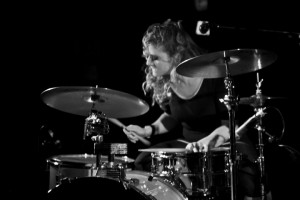 SOPHIA CACCIOLA drums in the progressive duo DO NOT FORSAKE ME OH MY DARLING in which she sings as well as drums. Do Not Forsake Me Oh My Darling just recently increased their visibility competing in Boston’s Rumble competition and Cacciola was last month’s centerfold musician in The Noise.
SOPHIA CACCIOLA drums in the progressive duo DO NOT FORSAKE ME OH MY DARLING in which she sings as well as drums. Do Not Forsake Me Oh My Darling just recently increased their visibility competing in Boston’s Rumble competition and Cacciola was last month’s centerfold musician in The Noise.
Cacciola has been in bands professionally for seven years. She became a drummer because she had a hard time keeping drummers in her old bands. Since she always liked drums, she learned how to play after a couple of months experimentation.
“I was always a very rhythmic singer anyway,” she said. “I never paid much attention to a lot of melody. So, it’s very easy for me to sing over the drums. The combination is so powerful. I just really enjoy it.” Her partner in Do Not Forsake Me Oh My Darling is Michael Epstein, a musician who plays a bass guitar through a bass amp and then through an octave pedal through a guitar amp so he plays the full range of high melody to low end.
Cacciola is different from other professional drummers in that it is still a new instrument for her and because she keeps things simple while she is singing over it. She doesn’t rely too much on her cymbals.
Her training on drums consisted of two lessons provided by a friend who came over and lent her a drum set. She finds it exhausting to sing lead vocals and play drums simultaneously, but still tries to be theatrical, moving and jumping while sitting down. “It’s very powerful imagery and it’s so physical,” she said.
Cacciola draws inspiration from the dual drummers in Modest Mouse whom she’s seen saw live several times, and she thinks the drummer in The Smiths is under-appreciated. “His drumming is really intense,” she said.
Cacciola said drummers get a lot of “crap” and are the brunt of all the jokes. She said that to some extent drummers are sideman, but that some have big personalities, and that drummers are a huge part of the band and its music “They’re the pulse, the heartbeat of the whole thing,” she said.
Cacciola said she has not experienced as much discrimination and sexism as she thought she would. She said only once in a while when she is carrying in the drums, people think she is the drummer’s girlfriend. “People don’t really care any more,” she said. “I think they think it’s cool because there are so few women drummers. Around town, there’s probably ten.”
“Women used to only be bass players. Now they’re drummers. I think that’s great. I hope they start younger. There was no real opportunity to play drums when I was a kid. It was like clarinet or viola. I hope that they’re more encouraged. Just because it’s so physical I think it has been like ‘that’s a boy’s instrument. You should play something else.’ As this younger generation has kids, I think that’s changing.”
For equipment Cacciola uses an old 1980s Toma Rock Star kit that cost her $75.
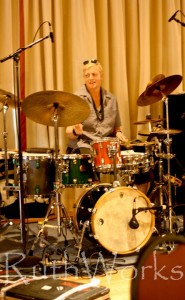 DIANE GATELY drums for Dirty Blonde Blues Band and the eight-piece Boston Soul Review. Gates also put in 17 years with Weepin’ Willie.
DIANE GATELY drums for Dirty Blonde Blues Band and the eight-piece Boston Soul Review. Gates also put in 17 years with Weepin’ Willie.
With Dirty Blonde for over ten years, and with Boston Soul Review for five, Gately is a popular figure on the greater-Boston music scene. She became a professional musician in the mid 1990s.
Gately was drawn to the drums in third grade when she saw a team of snare drums players in a parade. “When I saw the parade of snare drums coming down the walk all moving in the same time, that was it. I was hooked. I remember the moment. I said to my parents, ‘That!’ But they would not buy me a drum set. I just begged them, begged them, begged them. ‘My dad said , ‘No, little girls don’t play drums. All that crap, you know. The usual kind of sexist attitude.”
Gately eventually joined a drum core team and that was where she got her training, 13 years of drum core, each season lasting from September to the following August. Drum cores are not part of a high school music program. They are a nonprofit activity that tour and compete, and it is privately funded.
Later in life Gately took lessons three times a week. Her primary influences early on were all the other drum core drummers. “I was around some really incredible, freakishly good drummers, and I was mostly influenced by drum core drummers,” she said. Later on, she was influenced by fusion drummers Billy Cobham and Steve Gadd who toured with names like Paul Simon.
Gately is different from her contemporaries in the Boston scene because she came from the drum core background and learned to play drum set relatively late. “I didn’t start playing drum set until 1985,” she said.
When asked if drummers are sidemen, she said drummers “are the band. They’re usually the first thing that you get together. You can’t really create a song without a bottom and we’re the bottom, the bass and drums,” she said.
Gately said like any women trying to get into male dominated jobs, women drummers and bass players were discriminated against, more so than a woman piano player would be. “I’m a freelance drummer. When I show up at a gig, they roll their eyes, and they go, ‘Oh, shit! You couldn’t find a guy?’”
Because of this, Gately said, women drummers have to better to be able to deal with that attitude. Gately did turn their skepticism to smiles when they heard her playing. “We’re guilty until we’re proven innocent, whereas guy drummers are innocent first,” she said. “It’s a social thing because they think we can’t swear and grab ourselves.”
Gately faced these discriminations in the late 70s. “It was a completely different time,” she said. “Now it’s like a cool thing. But, it was not a cool thing in the 70s.” Gately credits popular women drummers like Cindy Blackman and Shelia E who exploded unto the scene when they drummed for big stars like Prince and Lenny Kravitz in the 1980s and 1990s and Meg White in this past decade. Beyounce too, whom Gately digs, has featured women drummers in her shows.
Gately said it is still more comfortable for some women to go on tour with an all female band because male musicians might believe they won’t have as much fun with a woman around. A male musician may think a female musician will tell his girlfriend if he had picked up another woman. “It’s a weird social thing. It’s awkward. It’s all how the other person was brought up.”
Gately sees a brighter future for women drummers. “It’s completely different now,” she exclaimed. “Female drummers now don’t have to deal with anything I had to deal with in the 70s.” Gately said it is clearer now that drums is about your brain, not your muscle.
Gately uses some vintage Ludwig gear, Yamaha, and a mixture of cymbals from different brands, depending on how they all blend together. She prefers small drum sets for business gigs like weddings, but when she plays in a rock or blues band she’ll have something huge.
LORRAINE KLEINER, formerly of the Dirty Mac Blues Band, only had a brief two year run as a professional musician.
Kleiner, after being a closet drummer for three decades, soon went back to being a full time mother. She played only for herself for 27 years and got invited to join the Dirty Mac after she was scouted at a blues jam at Johnny D’s.
Kleiner wanted to drum since she was five years old, always tapping on things, always feeling the rhythm in everything. My parents didn’t get me drums. They think girls don’t play drums. They kept sticking guitars in my hands. When I was in eleventh grade, I bought a second hand kit and wheeled it back to my basement with a supermarket cart and set it up.
After high school, Kleiner didn’t think about being in bands. She went to college planning to be a doctor. She married, had kids, and became a physician’s assistant. “I always knew that some day, when I was set, I’d have a room, and I’d get myself a brand new nice drum set, and then I would get back and try my hand at it, and do it as a hobby, as something I really enjoyed. And 27 years later it turned into a short run career with the Dirty Mac Blues Band.”
Not having any formal training and thinking outside of the box makes her a different kind of drummer. “I discovered now, playing as an adult, that whatever sound you think you can make, if it sounds cool, and if the band likes it, and it fit’s the music or brings creativity to it, there is no certain way to drum,” she said. “There’s a lot of ways to skin a cat. So if I use my hand on a cymbal, or get my prescription bottle and fill it with rice and it makes a cool shaking sound. I do percussion in all kinds of ways. I don’t limit myself. Whatever sounds right, I do.”
Kleiner taught herself to drum by playing along to her favorite records. She was a Grateful Dead fan, always listening to Bill Kreutzman and Micky Hart. “I like their style of drumming,” she said. “I’m mostly influenced by Buddy Rich. I’m a Buddy Rich type drummer. I like swing, big band sound.”
Kleiner said she never felt like a sideman when she was in The Dirty Mac Blues Band, which also featured Terry Mackie on vocals, Bashful Bob Ross on guitar, and Matt Robinson on bass. “It was a real collaborative effort, the way we wrote our songs,” she said. “Bob would come up with a guitar riff. I would add an appropriate drum line. Matt would put on a bass line, and we really worked together. I really felt like I owned a certain part of the song and was responsible for creating a certain part of the song and for holding it down. It didn’t feel side at all, it felt part of the whole.”
Kleiner didn’t have to deal with any discrimination for being a woman drummer. By the time she got into a band, things had changed since the 1970s and 1980s. “I think that’s what made us kind of odd,” she said. “You had Terry in the front, me on the drums. I think a woman drummer is a little different than the standard drummer set up. I think it was a novelty. I think people appreciate it. I had lots of women in the crowd commenting on how cool it was and something they always would’ve liked to do or try.”
In the intervening years between high school and family life, Kleiner’s husband never even knew she could play. She got an electronic drum set to tinker with at home, and she got a small acoustic set to play out. Kleiner said there should be no reason these days for women not to take up drums.
“I do think women bring a different sensibility to drumming,” she said. “I didn’t find myself trying to show up other members of the band. I play cooperatively, I think. Some of the male drummers who came and auditioned for my spot when I was leaving, they were over running things and really trying to over power. I don’t know if that’s necessarily a male thing, but there might be a different way in how women play drums as opposed to men.”
Kleiner had been using a Roland TB14 electronic drum set and a small five-piece beginners Sonor drum set jazz style that would fit in a small dive bars that the Dirty Mac Blues Band were staring out in.
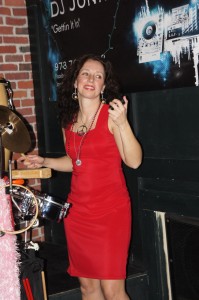 MAUREEN MEDERIOS, percussionist for Boston’s disco band BOOTY VORTEX the last seven years, started learning to play drums when she was eight years old. She’s been playing professionally for 20 years. Mederios started playing drum sets in fourth grade and she was the drummer for Kip London, The Seventh Street Blues Band, and other blues bands.
MAUREEN MEDERIOS, percussionist for Boston’s disco band BOOTY VORTEX the last seven years, started learning to play drums when she was eight years old. She’s been playing professionally for 20 years. Mederios started playing drum sets in fourth grade and she was the drummer for Kip London, The Seventh Street Blues Band, and other blues bands.
“I love playing drums. I think it just comes naturally from some inner soul,” She said. “I sometimes get to a point I can play from through myself as opposed to being attentive to the cues of the entire band. It just seems like a natural process. I’m not sure if other people do that as well. The best part of playing drums is when I’m letting myself freestyle.”
Medeiros became a drummer because she felt she could play anything she wanted to on it, and she had always gravitated to the snare drum. Her grandfather was a classical Portuguese guitarist on the RCA record label, and she thought she could play with him.
“The drums in general just seems like it’s the one in charge, and fun, and it’s the most physical as well,” she said.
It is also exhausting carrying all of her percussion instruments into the Booty Vortex gigs. But she loves it when it all comes together. “We try to balance each other out and work together,” she said. “It takes some time to get that groove and that feeling, but it’s definitely worth it in the end when you lock it in.”
Medeiros played in every school band possible, including the jazz band, and she played conga when she was 13. At age 16, her mother bought her an actual drum set and sent her to private lessons for jazz. Her influences include Tito Puente for timbale and Latin percussion. She saw Buddy Rich a couple of times and his style of jazz drumming always stuck in her head. More recently, Medeiros is into Shelia E and Beyonce’s band drummer.
Buddy Rich was someone she saw as a teenager. She recalls him playing the bass drum with his sticks instead of using his foot pedal. “He’s just having a blast, going a mile a minute,” she said. “Just the excitement of seeing him. It was all about him. It was amazing. He broke all the rules. He did whatever he felt. It was like he was in a zone and kept on going. I think that that will always stick in my head that he could do and express and communicate to other people, making them happy as well, by just letting yourself go and do what you need to do.”
As for the term sidemen, Medeiros didn’t buy into it. “No, we’re the heartbeat. We’re the actual heart translated into the human body. For crying out loud, of course we’re the ones keeping the beat and the rhythm.”
Medeiros said there has always been an element of sexism to the perception of women playing drums. She enjoys seeing the reactions of doubtful male players when they see she knows what she is doing. She has a sense of humor about that kind of perception, finding it amusing when they question her credentials.
She thinks the future should be just fine for women drummers, even though there is physicality of playing and lugging their gear to gigs.
Medeiros uses LP congas and timbales and sticks from Eagle or Vic Firth. She still has a taped together wood block from when she was 16. “It isn’t the best equipment in the world but it certainly is mine,” she asserted.
Well, there you have it, folks. Women drummers are here to stay, and you can look forward to seeing a lot of more of them in the not too distant future
hey Bill, Saw the great article above. Would you like to do one on girls in rock, IMA, me and my sister Jean/Fanny and our launch gigs for new cd “Play Like a Girl”? We’ll be doing a benefit gig here at IMA (outside of Northampton, MA, about 20 from Smith College but in the country) on Sat Aug 20: a concert/barbecue/dance. We’ll end with Motown songs Jean and I learned when in our first all-girl band, the Svelts (’65-’68) before getting to LA and starting to record seriously.
I think you’ll find the following links most interesting.
Regards, June
http://msmagazine.com/blog/blog/2011/05/26/you-never-heard-of-fanny/
http://www.ima.org
http://www.junemillington.com
http://ranezine.blogspot.com/2011/06/original-female-rockers-from-fanny.html
http://www.reverbnation.com/junemillington
wow, what a great article !
i know and remember laurel from her days with the (wonderful) ,,,Lou Miami and the Kozmetix and she certainly held her own and more. I think it’s great there are more women kickin’ ass out there from behind the kit.
i alway thought people play, not gender, i tried to get my two girls to play, they did their own thing, their boys play it guess it skipped a generation, anyway it feels good in my heart to see girls play, it rejunivating